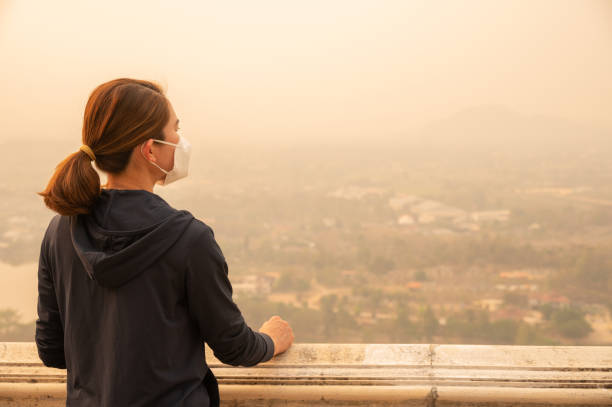A combination of genetic predisposition and long-term exposure to air pollution, as well as each factor independently, may facilitate and worsen COVID-19 infection, per a study published yesterday in PNAS.
Researchers in China and the United Kingdom parsed data from 458,396 UK Biobank participants who were COVID-naïve at baseline to investigate links between genetic vulnerability and exposure to air pollutants, alone and together, and SARS-CoV-2 infection, hospitalization, and death. The association of air pollutants and COVID-19 severity was also evaluated among 110,216 COVID-19 patients.
Data were collected from online questionnaires, interviews, physical assessments, electronic health records, and data from Public Health England, Public Health Scotland, and the Secure Anonymized Information Linkage.
"According to the World Health Organization (WHO) 2019 report, over 90% of the global population still lives in environments that do not meet the air quality guidelines set by the WHO," the researchers wrote. "Evidence suggests that air pollutants can compromise lung defenses against infections and potentially increase the expression of SARS-CoV-2 receptors in the pulmonary system."
COVID-infected participant outcomes
In the infected group, there were 5,972 hospitalizations and 1,135 deaths.
COVID-infected participants with a high genetic risk and extended exposure to high levels of air pollutants had a 97% (fine particulate matter [PM2.5]), 90% (coarse particulate matter [PM10]), 86% (nitrogen dioxide [NO2]), and 90% (nitrogen oxides [NOx]) higher risk of COVID-19 hospitalization and a 104%, 91%, 108%, and 114% higher risk of death, respectively, than participants at low genetic and environmental risk.
COVID-naïve cohort outcomes
During a median follow-up of 2.07 years, the COVID-naïve group experienced 110,216 COVID-19 infections. At later follow-up, there were 6,499 hospitalizations and 1,135 deaths.
Our findings also have important practical implications, including mask-wearing and limiting outdoor activities during periods of high pollution.
Genetic risk per interquartile-range increase in air pollution was linked to an increased risk of COVID-19 hospitalization (75%) and death (68%, only for exposure to particulate matter) in this group.
Long-term air-pollutant exposure was significantly and independently tied to an increased risk of poor COVID-19 outcomes in the COVID-naive cohort. For each interquartile range–rise in air-pollution concentrations, the risks of COVID-19 infection were 96% higher for PM2.5 and PM10, 97% for NO2, and 98% for NOx.
"The risk of COVID-19-related outcomes showed a rapidly increasing trend at lower concentrations of air pollutants, while at higher concentrations, the increase in risk tended to slightly level off," the researchers wrote.
The authors said the study "demonstrates that air pollutants interact with host genetic susceptibility in both multiplicative and additive manners, thereby influencing the risk of COVID-19 severity."
"Our findings also have important practical implications, including mask-wearing and limiting outdoor activities during periods of high pollution," they added. "These findings are expected to provide important evidence for future research on the interplay of genetics and air pollution on the onset and progression of acute respiratory infections."

















